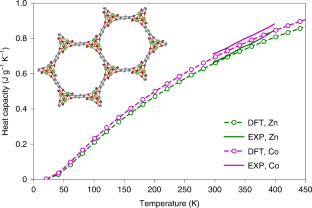2022-10-18 スイス連邦工科大学ローザンヌ校(EPFL)
有機金属骨格(MOF)は、ナノサイズの細孔を持つ材料の一種である。この細孔によってMOFは記録的な内部表面積を持ち、石油化学製品やガスの分離、DNAの模倣、水素の生成、水中の重金属、フッ素陰イオン、さらには金の除去など、さまざまな用途に極めて汎用的に利用できる。
今回の研究で最も革新的な点である。局所的な化学環境が、MOF分子内の各原子の振動をどのように変化させるかを予測する機械学習モデルである。
今回、研究者たちは、MOFの熱容量を予測する機械学習モデルを開発した。
200回の高価な計算を行うことで、振動が化学環境にどのように依存するかというモデルを訓練するための4万件のデータポイントを得ることができた。
いくつかのMOFを再合成し、合成溶媒を慎重に取り除いて熱容量を測定したところ、結果はモデルの予測と非常によく一致した。
<関連情報>
- https://actu.epfl.ch/news/machine-learning-predicts-heat-capacities-of-mofs/
- https://www.nature.com/articles/s41563-022-01374-3
ナノポーラス材料の熱容量予測のためのデータサイエンス・アプローチ A data-science approach to predict the heat capacity of nanoporous materials
Seyed Mohamad Moosavi,Balázs Álmos Novotny,Daniele Ongari,Elias Moubarak,Mehrdad Asgari,Özge Kadioglu,Charithea Charalambous,Andres Ortega-Guerrero,Amir H. Farmahini,Lev Sarkisov,Susana Garcia,Frank Noé & Berend Smit
Nature Materials Published:13 October 2022
DOI:https://doi.org/10.1038/s41563-022-01374-3

Abstract
The heat capacity of a material is a fundamental property of great practical importance. For example, in a carbon capture process, the heat required to regenerate a solid sorbent is directly related to the heat capacity of the material. However, for most materials suitable for carbon capture applications, the heat capacity is not known, and thus the standard procedure is to assume the same value for all materials. In this work, we developed a machine learning approach, trained on density functional theory simulations, to accurately predict the heat capacity of these materials, that is, zeolites, metal–organic frameworks and covalent–organic frameworks. The accuracy of our prediction is confirmed with experimental data. Finally, for a temperature swing adsorption process that captures carbon from the flue gas of a coal-fired power plant, we show that for some materials, the heat requirement is reduced by as much as a factor of two using the correct heat capacity.



